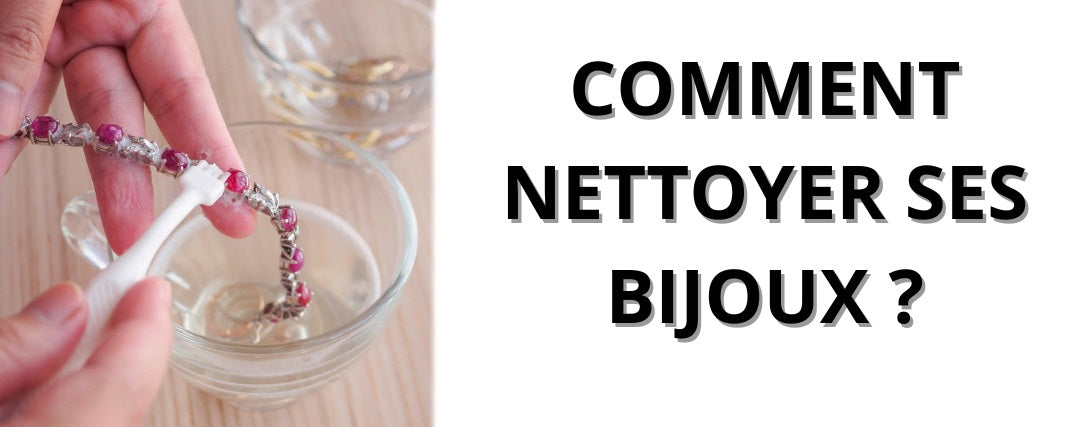Have you ever looked at your favorite ring or necklace and thought it had lost its shine? Don't worry, it happens to all of us. Jewelry, like everything you wear, accumulates dust, dirt, sweat, which causes it to lose its shine. This is why good cleaning is essential. But wait a bit before grabbing the dish soap! Not all jewelry is cleaned the same way. Using the wrong cleaning method could do more harm than good.
This guide is designed to give you the best methods for whatever jewelry you need to clean. So we'll look at the different types of jewelry, why regular cleaning is essential, and the do's and don'ts of jewelry cleaning. We also provide you with a step-by-step guide to cleaning different types of jewelry, explain when and why professional cleaning may be necessary, and finally, we review some of the best jewelry cleaning products available on the market. walk.
Whether you are a jewelry enthusiast, a beginner who has just inherited pearls from your grandmother, or simply someone who wants to maintain the shine of your jewelry, this guide is for you. Let’s dive into the matter and restore the shine to your jewelry!
Understanding the different types of jewelry
First of all, not all jewelry is created equal, especially when it comes to cleaning it! Jewelry is as varied and unique as the people who wear it. From dazzling gold chains to delicate silver earrings, from bold natural stone rings to delicate pearl necklaces, each piece has its own charm...and its own cleaning needs.
Gold jewelry
Gold, a timeless classic, is often combined with other metals for strength and durability. It is quite durable and does not tend to fade, but it can still accumulate dirt and lose its shine over time.
Silver jewelry
Silver, while stunning and versatile, is more susceptible to tarnishing. Tarnish is a blackish layer that forms when silver reacts with sulfur compounds in the air. Cleaning silver requires a little extra care to maintain its shine.
Natural stone jewelry
Natural stones, whether fine or precious, add a touch of color and personality to any jewelry. However, natural stones vary greatly in hardness and porosity, meaning some of them can be very sensitive to harsh cleaners. It is essential to know which gemstone you are dealing with before beginning the cleaning process.
Pearl jewelry
Pearls are the result of natural protection of certain molluscs which require special attention. They are very sensitive to chemicals and abrasion. Even natural oils and body sweat can damage their shiny surface!
Understanding the characteristics of your jewelry is the first step in knowing how to clean it properly. In the following chapters, we'll cover the best cleaning practices for each type of jewelry, so your precious pieces can continue to shine like the first day you wore them. At work!
Why is regular cleaning essential for your jewelry?
Okay, let's be real. You're probably wondering, "Why should I clean my jewelry regularly?" After all, it's not like a car that needs a regular oil change or a carpet that accumulates visible dust, right? Even if your jewelry doesn't have a motor and isn't sitting on your floor, it's exposed to various elements that can dull its shine over time.
First of all, every time you wear your jewelry, it is exposed to sweat and cosmetic products, among other things. Not forgetting environmental elements such as dust, dirt and air pollutants. Over time, these elements can build up and dull the appearance of your gold jewelry, dull your silver jewelry, cloud the natural stones in your jewelry , and reduce the luster of your natural pearls.
But here's the good news: regular cleaning can remedy all of this! Keeping your jewelry clean not only improves its appearance and keeps it as dazzling as the day you bought it, but also extends its life and ensures that it can be worn and enjoyed for years to come. years, even generations.
Think about it: you wouldn't wear the same outfit for months without washing it, would you? Why wouldn't it be the same for your jewelry? Regular care and cleaning will help your jewelry maintain its shine, so you're always ready to impress, whether it's an ordinary work day or a special occasion. Ready to restore shine to your jewelry? Now let's move on to the do's and don'ts of cleaning your jewelry.
Do's and Don'ts of Cleaning Jewelry
Before we get into how to clean your different types of jewelry, it's worth establishing a few basic rules. Cleaning jewelry is not a one-size-fits-all task, and knowing what to do and what to avoid can save you from unintentionally damaging your precious gems.
Things to do when cleaning your jewelry
Know your jewelry
As we've already mentioned, understanding the type of your jewelry and its specific needs is essential to cleaning it properly. Always make sure you know the materials they were made with before you start cleaning.
Be gentle
When it comes to cleaning jewelry, it's always best to take a gentle approach. Avoid rubbing too hard, as you risk scratching or damaging the surface of your jewelry, especially delicate materials like pearls or natural stones.
Perform regular maintenance
Don't wait until your jewelry is visibly dirty to clean it. Regular, gentle cleaning can help maintain its shine and prevent the build-up of dirt and grime.
What not to do when cleaning your jewelry
Do not use harsh chemicals
Avoid using cleaning products that are too harsh or acidic, such as bleach or ammonia. These products can damage your jewelry, especially stones and freshwater pearls.
Do not soak certain natural stones
Not all natural stones can be soaked in water. Some, like opals or turquoise, are porous and can absorb water, which can damage them. Always check whether it is possible to soak your natural stone jewelry before doing so.
Do not use toothpaste
Contrary to popular belief, toothpaste is not suitable for cleaning jewelry. The abrasive particles it contains can scratch the surface of metals and stones.
Remember, proper care is the key to preserving the beauty of your jewelry and extending its life. Now that we've established the do's and don'ts, we're ready to get into the nitty-gritty of cleaning. Let's get started!
Step-by-step guide to cleaning your jewelry
Here we will discuss the process of cleaning different types of jewelry, one by one, step by step.
How to clean gold jewelry?
Necessary material
A bowl, hot water, dishwashing liquid, a soft-bristled toothbrush and a soft cloth.
Path to follow
- Fill a bowl with warm (not hot) water and a few drops of dish soap.
- Place your gold jewelry in the bowl and let it soak for 15 to 20 minutes.
- After soaking, gently scrub the jewelry with a soft-bristled toothbrush. Pay attention to nooks and crannies where dirt could accumulate.
- Rinse the jewelry under lukewarm running water. Be sure to close the drain beforehand or use a strainer to avoid any unfortunate losses!
- Dry and polish the jewelry using a soft, lint-free cloth.
Care advice for gold jewelry
Avoid wearing gold jewelry when doing difficult work or handling harsh chemicals.
How to clean silver jewelry?
Necessary material
A bowl, hot water, baking soda, a soft-bristled toothbrush, and a soft cloth.
Path to follow
- For light tarnishes, create a paste of two parts baking soda to one part water.
- Apply the paste using a soft toothbrush, gently scrubbing the silverware.
- Rinse under lukewarm running water and dry thoroughly with a soft cloth.
If there is heavy tarnish, consider using a commercially available silver cleaning product, but be sure to carefully follow the manufacturer's instructions.
Care advice for silver jewelry
Store silver in a cool, dry place, ideally in a tarnish prevention bag or wrapped in a piece of felt or soft cloth.
How to clean stainless steel jewelry ?
Necessary material
A bowl, warm water, mild dishwashing liquid, a soft-bristled toothbrush, a soft cloth and baking soda for the toughest stains.
Path to follow
- Mix warm water and a few drops of mild dish soap in a bowl.
- Soak your stainless steel jewelry in the solution for a few minutes.
- Gently scrub the jewelry with a soft-bristled toothbrush. For tougher stains, you can create a paste of baking soda and water and use it to scrub.
- Rinse the jewelry under lukewarm running water, making sure all the soap is removed.
- Dry carefully with a soft, lint-free cloth to avoid water spots.
Maintenance advice for stainless steel jewelry
Even though stainless steel is very durable, try to avoid wearing it during activities that may result in excessive sweating or exposure to chemicals, such as exercising or swimming in chlorinated water.
How to clean natural stone jewelry ?
Necessary material
A bowl, warm water, mild soap, a soft-bristled toothbrush and a soft cloth.
Note: Some natural stones should not be soaked or exposed to soap. Check the characteristics of your stone before cleaning it.
Path to follow
- Mix warm water and mild soap in a bowl.
- Soak the jewelry for 20 to 30 minutes.
- Use a soft toothbrush to gently clean the stone and any crevices in the setting.
- Rinse under lukewarm running water.
- Dry with a soft, lint-free cloth.
Care advice for natural stone jewelry
Always put on natural stone jewelry after applying makeup, hairspray and perfume to avoid exposure to chemicals.
How to clean pearl jewelry ?
Necessary material
A soft, clean makeup brush, warm water, mild soap, and a soft cloth.
Path to follow
- Dip the brush in warm, soapy water.
- Gently go over each bead with the brush.
- Wipe the beads with a soft, damp cloth.
- Let the beads air dry before storing them.
Care advice for pearl jewelry
Always remove your pearls before exercising or strenuous activity. Sweat can be particularly damaging to pearls.
Keep in mind that while cleaning at home can do wonders for the care of your jewelry, sometimes a visit to the professional may be necessary. In the next chapter we will see when and why this may be the case.
Professional jewelry cleaning: when and why?
No matter how diligently we clean our jewelry at home, there are times when professional cleaning is necessary. In certain situations, the expertise of a professional jeweler is useful to ensure the longevity and brilliance of our jewelry. But when should we call on professionals and why?
When it comes to high value items
If your jewelry contains rare stones, antique pieces, or heirlooms, it is safest to have it professionally cleaned. Their value, both monetary and sentimental, is not something you want to risk.
When jewelry is very dirty
Sometimes the dirt buildup is so bad that a home cleaning is not enough. Jewelers have specialized tools, like ultrasonic cleaners, that can thoroughly clean your jewelry without damaging it.
In case of visible damage or wear
If your jewelry has loose stones, worn prongs, scratches, or any other signs of damage, professional cleaning is necessary. The jeweler can not only clean your jewelry, but also make any necessary repairs.
For periodic deep cleaning
Even if your jewelry does not fall into the categories above, it is advisable to take it to a professional for a deep cleaning once a year. He will have the tools and knowledge to clean your jewelry more thoroughly than is possible at home.
Why is professional cleaning necessary, you ask? Professionals not only clean your jewelry, they also inspect it for possible problems, like loose stones or weakened clasps. These are things that are easy to miss for the untrained eye. They can ensure that your jewelry is not only clean, but also in good condition, extending its lifespan.
So, while regular home cleaning is essential to preserve the shine of your jewelry, don't forget to schedule an annual visit to the jeweler. Think of it like a spa day for your jewelry: a chance to rejuvenate and shine brighter than ever! In the next chapter, we'll look at some of the best products you can use to clean your jewelry at home.
The Best Jewelry Cleaning Products on the Market
While most of the ingredients needed for jewelry cleaning at home may already be in your kitchen, there are also a variety of excellent commercial products that can make the task easier and more effective. Here are some of the best jewelry cleaning products currently available on the market:
- Weiman Jewelry Cleaner: This professional ammonia-free solution is both gentle and effective for a wide variety of jewelry types. It comes with a small brush for cleaning crevices and hard to reach places.
- Connoisseurs Dazzle Drops Advanced: Known for its non-toxic formula, this product not only cleans, it also adds a protective layer to your jewelry to prevent tarnishing in the future. It is safe to use on gold, platinum, diamonds and other precious stones.
- Brilliant Jewelry Cleaner: This cleaner comes with a basket for soaking and a small brush, making it an all-in-one solution for cleaning your jewelry. It is safe to use on all types of jewelry.
- Hagerty Silver Clean: For your tarnished silver items, this professional-grade cleaner helps restore shine and remove tarnish quickly and effectively.
- Simple Shine Gentle Jewelry Cleaner Solution: This cleaner is a 100% non-toxic solution, perfect for deep cleaning while respecting your jewelry. It is suitable for a wide variety of materials including gold, palladium, stainless steel, silver, etc.
- Magnasonic Professional Ultrasonic Jewelry Cleaner: If you're looking for a more technological solution, this ultrasonic cleaner generates 42,000 Hz sound waves for powerful yet gentle cleaning without harsh chemicals or scrubbing.
Remember to always follow the manufacturer's instructions when using a commercial jewelry cleaning product to avoid accidental damage. These cleaners can be a great addition to your regular cleaning routine and ensure that your jewelry will continue to shine for years to come!
Conclusion
Remember that jewelry is not just about shiny gold, sparkling fine and precious stones or lustrous pearls. It's about the memories associated with each piece, the moments it witnessed and the stories it tells. Regular maintenance ensures that the pieces you hold dear will continue to be part of your story for many years to come.
Finally, we hope that this guide will allow you to take care of your jewelry properly!





